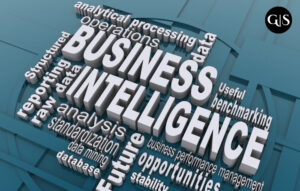In today’s world, there’s a huge amount of data available, and businesses are using it to learn more and improve how they work. Two important tools for handling this data are Business Intelligence (BI) and Artificial Intelligence (AI). Although they may seem similar, they have different roles and do different things. Let’s explore what each one does and answer the question: Are artificial intelligence and business intelligence the same thing?
What is Business Intelligence?
Business Intelligence (BI) is all about gathering, integrating, analyzing, and presenting business data. The goal? To support better business decisions. BI tools and systems are essential in strategic planning, helping companies access, analyze, and act on their data.
Key Features of BI:
- Data Collection and Integration: BI systems pull data from various sources like databases, spreadsheets, and CRM systems.
- Data Analysis: Tools like data mining, statistical analysis, and process mining help businesses spot trends and patterns.
- Reporting and Visualization: BI tools create reports and visualizations—like dashboards and charts—that make data insights easy to understand and use.

What is Artificial Intelligence?
Artificial Intelligence (AI) mimics human intelligence processes using machines, especially computers. These processes include learning (acquiring information and rules for using it), reasoning (using rules to reach conclusions), and self-correction. Artificial Intelligence (AI) encompasses technologies that emulate human cognitive functions. These include tasks like visual perception, speech recognition, decision-making, and language translation, traditionally requiring human intelligence.
Key Features of AI:
- Machine Learning (ML), a subset of AI, enables systems to autonomously learn and improve from data without explicit programming. It underpins AI advancements by training algorithms to recognize patterns and make predictions based on data.
- Natural Language Processing (NLP) enables machines to comprehend and interpret human language, facilitating tasks like sentiment analysis, language translation, and chatbot interactions.
- Robotics and Automation: AI drives advancements in robotics, enabling machines to perform complex tasks.
- Predictive Analytics: AI algorithms analyze historical data to make predictions about future events.

Comparing Business Intelligence and Artificial Intelligence
Let’s compare BI and AI across various dimensions:
| Aspect | Business Intelligence (BI) | Artificial Intelligence (AI) |
| Purpose | Analyzing historical data to support decision-making | Simulating human intelligence to perform tasks |
| Data Handling | Collects, integrates, and analyzes data |
Learns from data and improves over time |
| Output | Reports, dashboards, visualizations | Predictions, automation, intelligent behavior |
| Human Involvement | Requires human intervention for analysis and interpretation | Can operate autonomously with minimal human input |
| Applications | Performance management, operational efficiency, strategic planning | Autonomous vehicles, virtual assistants, predictive maintenance |
Is Artificial Intelligence the Same as Business Intelligence?
The short answer is no, artificial intelligence is not the same as business intelligence. While both involve data and aim to enhance business operations, they have distinct scopes and functionalities.
- BI is about descriptive and diagnostic analytics, using historical data to inform decisions.
- AI is about prescriptive and predictive analytics, automating decision-making processes, and performing tasks that typically require human intelligence.
Real-World Applications
Business Intelligence:
- Sales Analysis: BI tools analyze sales data to identify trends, forecast future sales, and support data-driven decision-making.
- Customer Insights: Businesses use BI to understand customer behavior and preferences, enhancing customer relationship management (CRM).
- Operational Efficiency: BI systems monitor and optimize business processes, reducing costs and improving efficiency.
Artificial Intelligence:
- Customer Service: AI-powered chatbots provide 24/7 customer support, handling inquiries and resolving issues.
- Healthcare: AI algorithms analyze medical images for early disease detection and provide personalized treatment plans.
- Finance: AI systems detect fraudulent transactions and automate trading strategies based on predictive analytics.
Conclusion
Business Intelligence and Artificial Intelligence are both transformative technologies that drive business success, but they serve different purposes. BI helps businesses make sense of historical data and improve decision-making, while AI focuses on creating intelligent systems that can perform tasks autonomously. By leveraging both BI and AI, businesses can harness the power of data to stay competitive and innovative.
At Gizmo Sprout, we’re dedicated to exploring and explaining the latest trends in technology. Stay tuned for more insightful articles on AI, BI, and other cutting-edge technologies.


7 Comments
Leave a Reply